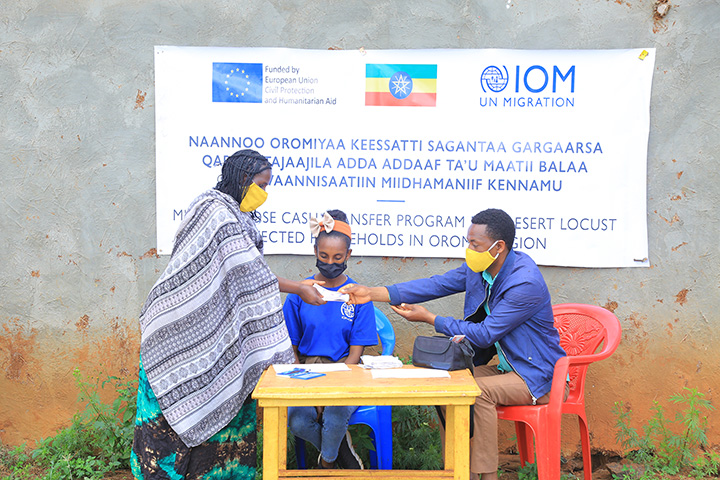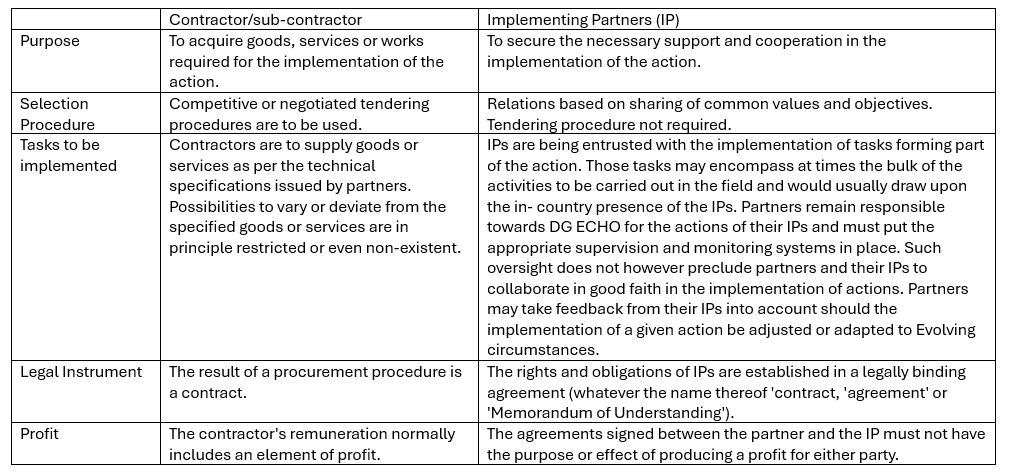WORKING WITH DG ECHO AS AN INTERNATIONAL ORGANISATION | 2021 - 2027

PARTNERS AND IMPLEMENTING PARTNERS
DG ECHO pillar assessed Partners are to implement humanitarian aid actions with the requisite degree of care, efficiency, transparency and diligence, in compliance with the stipulations of the Humanitarian Aid Contribution Agreement.
To implement an action, a DG ECHO pillar assessed Partner can either:
- Implement it directly,
- Cooperate with other Pillar assessed Partners or
- Work with Implementing Partners
PARTNERS
The number and the complexity of today’s disasters are stretching humanitarian actors’ capacities to respond effectively and efficiently to these disasters.
Strengthening collaboration between humanitarian Organisations operating in the field can bring advantages such as complementarity, increased geographic coverage, increased target population coverage and decreased duplication.
Partners may decide to join forces to respond to complex and major crises and create a consortium.
This coordinated approach consists in signing a single (multi-partner) Contribution Agreement with several pillar-assessed Partners which have chosen to collaborate more closely in the field to address the needs of a specific crisis.
Under this approach the collaboration takes place ex-ante between Partners present in the field.
The pillar-assessed Partners share their needs assessment (or they carry out joint needs assessment), they develop their response in a collaborative way which is then translated into a joint Logframe.
The Lead Organisation will then submit one single proposal on behalf of the consortium.
CONSORTIUM – MULTI-PARTNER HUMANITARIAN AID CONTRIBUTION AGREEMENT
A consortium within a DG ECHO-funded Contribution Agreement is defined as an arrangement where multiple pillar-assessed DG ECHO Partners (e.g. UN agencies, the ICRC, the IFRC and some MSSAs Partners of DG ECHO) are all contracting parties to a multi-partner Contribution Agreement with DG ECHO. In this set-up, all Partners are parties to the Agreement. However, the Lead Organisation may sign the agreement on behalf of all Partners participating in the implementation of the Action or all parties may directly sign on their own behalf.
The Lead Organisation acts as an interface with DG ECHO (e.g. with respect to communication, action and payments’ management) and monitors that the action is implemented properly by the Partners.
The Organisation and each pillar-assessed Partner shall be financially responsible solely for the part of the Action to be implemented by it (including by its Contractors and Implementing Partner), as set out in the e-Single Form, or for the activities assigned to it during the implementation of the Action in case these are not defined in the Single Form. More information on this can be found in the Annex IIa to the HACA defining the provisions applicable to Multi-Partner Humanitarian Aid Contribution Agreements.
- DG ECHO Certified NGO Partners and MSSA entitled to work under direct management only, cannot be Partners under the HACA: they will participate in the implementation of the action as Implementing Partners (IPs). Only pillar assessed entities entitled to work with the Commission under indirect management can be Partners under the HACA.
- DG ECHO pillar assessed Partners must by default be indicated as ‘Partners’ in the description of the Action (Chapter 10.6 of the e-Single Form). By doing so, the pillar assessed Partner is party to the Agreement and can rely on its own Rules and Procedures when implementing the action, as Ex-Ante pillar assessed. In exceptional and duly justified cases, the pillar assessed Partners participating in the implementation of the action may agree to indicate one (or more) pillar assessed Partner as ‘Implementing Partner’. In such cases, the Lead Organisation retains full operational and financial responsibility for the activities performed by the Implementing Partner. Moreover, the Lead Organisation must ensure that all the obligations listed in article 2: General Obligations (section ‘other obligations’) of the HACA General Conditions, also apply to the Implementing Partners.
IMPLEMENTING PARTNERS
Pillar assessed Partners may entrust tasks forming part of the action on a non-profit basis to one or several Implementing Partners (IPs).
Implementing Partner is any legal entity to which the IO entrusts any tasks under a DG ECHO-funded Action and transfers the corresponding financing. In this respect, an IP is any of the following entities:
- Entities affiliated to the Partner or with which the latter is affiliated (e.g. NGO families, networks, federations, etc.). Such entities may be involved in the implementation of an action, for example with the following functions (not mutually exclusive): performing administrative and programmatic tasks; performing operational tasks, e.g. implementing the action as the registered entity in the country of implementation.
- Local entities: entities established in the country of implementation of the action (e.g. local or grassroots Organisations).
- Non-local entities: entities, which are neither affiliated to the Partner nor established in the country of implementation of the action.
It should be noted that NGOs certified as DG ECHO Partners cannot be Partners under the Humanitarian Aid Contribution Agreement (HACA), but they can participate in the action as Implementing Partners.
The pillar assessed Partner must ensure that the conditions applicable under the HACA are also applicable to Implementing Partners (see article 2: General Obligations (section ‘other obligations’)) when implementing a DG ECHO funded Action.
Where the Implementing Partners are part of the Partner’s networks, federations or confederations which regularly cooperate with them (or with their Implementing Partners), the Partner must moreover ensure that the costs charged to the action are limited to the costs actually incurred and that the Partners comply with the principle of sound financial management and keep records on their costs.
Since DG ECHO-funded Action must be carried out in line with the highest ethical standards and respect of the core values (such as respect for human dignity, freedom, democracy, equality, the rule of law and human rights, including the rights of minorities) – the Implementing Partner must also be able to uphold these standards and values in both its recruitment and employment policies and in the implementation of its activities. Implementing Partners must comply with the applicable national law on taxes, labour and social security.
In the context of EU humanitarian aid implementation, Implementing Partners must also maintain respect of fundamental humanitarian principles. This is of particular importance when the Implementing Partner has ties with the local or national authorities since such ties, while not prohibited, should never impede the impartial and neutral implementation of the activities entrusted to the Implementing Partner.
IMPLEMENTING PARTNERS in THE e-SINGLE FORM
The decision to entrust tasks to Implementing Partners should be mentioned in section 10.6 of the e-Single Form (e-SF).
In this Section, the Organisation must list all Implementing Partners and indicate (amongst others) the part of the action budget to be allocated to them.
The Organisation is able to add or remove Implementing Partners unilaterally in the e-Single Form (at RQ and MR stages only), as this is considered a Non-Essential Change. However, if the Organisation considers that there would be significant operational consequences from removing an IP, or if it is aware that adding an IP may raise problems in terms of compliance with the humanitarian principles, it is obliged to contact DG ECHO in line with its obligations under the Humanitarian Aid Contribution Agreement.
At the latest at Final Report stage, the Organisation must ensure that exhaustive information on all IPs are included in the e-SF before submitting the Final Report (see e-Single Form Guidelines).
Note that, selecting a DG ECHO pillar assessed Partner as Implementing Partner shall be exceptional and duly justified. If a pillar assessed Partner wants to cooperate with other pillar assessed Partners, this is possible under a Multi-Partner Humanitarian Aid Contribution Agreement.
In order to ensure that the Action is implemented properly, Partners must have internal arrangement regarding their operation and cooperation with the other members of the consortium and their Implementing Partners.
IMPLEMENTING PARTNERS and CONTRACTORS
Sometimes, it can be difficult to draw the line differentiating a Contractor from an Implementing Partner. The following table indicates the main differences between these two actors.






